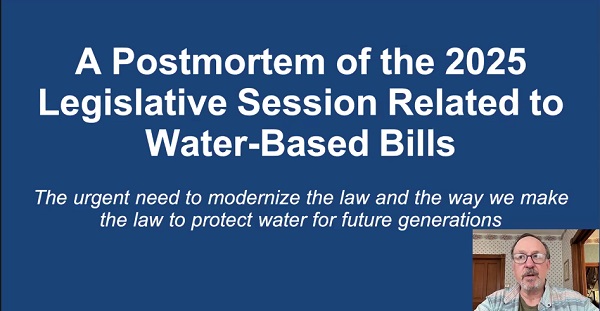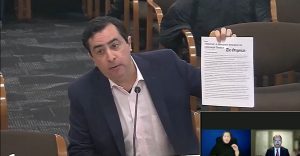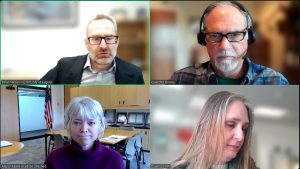2025 Legislature failed to modernize water law
8 min read
Presenter: The executive director of Water League reviewed water-related bills in the 2025 Oregon Legislature. Speaking at a community rights meeting Aug. 27, Chris Hall:
Christopher Hall (Water League): The governor had called for modernizing the water code, the first type of big-picture, big-scale modernization that would have happened since over 70 years, 1955. Well, I’m here to report, I don’t really think that that happened.
[00:00:26] In my view, Gov. Kotek had a beautiful image and she made it very clear as to what that image was. It was made out of many different puzzle pieces that would come together to paint this picture. And essentially what the Legislature did was they reached over to her box of puzzle pieces, threw them onto the table, some fell off the table. Some were facing up or some were facing down, and they called it good.
[00:00:51] And only a few that were facing up ever made it past final votes to get signed into law. And they were disconnected, they were not part of a bigger picture. And it was an example of how the conventional wisdom really just ruined the process in my view.
[00:01:11] The conventional wisdom systematically excluded the broader public interest from shaping water policy, resulting in weak, ineffective laws that failed to address the state’s growing water crisis.
[00:01:24] The conventional wisdom clings to a regressive 19th-century and 20th-century worldview that empowers privileged stakeholder syndicates to rewrite legislation behind closed doors, leaving 4.2 million Oregonians and future generations excluded from meaningful participation.
[00:01:46] Presenter: Public participation is essential, because in Oregon all water belongs to the public. Chris Hall:
[00:01:51] Christopher Hall (Water League): The statute 537.110, titled ‘Public Ownership of Waters,’ states: ‘All water within the state from all sources of water supply belongs to the public.’
[00:02:05] To hold water in trust, state officials must consider the greater public interest as a distinct factor unto itself that focuses on the public health, safety, and welfare of the present and future and upon the ecosystems upon which all life depends.
[00:02:24] Oregon must do a better job upholding its duty under the public trust doctrine, which requires the state to manage water resources, not just for the short-term extractive interests in economic productivity, but for the health, safety, and welfare, and ecosystems of the present and future.
[00:02:46] Presenter: Chris reviewed water bills from the 2025 session.
[00:02:49] Christopher Hall (Water League): House Bill 3194—which is near and dear to Water League’s heart—is the Farm Worker Housing Bill. And I’ll share with you how that exemplifies much of the problems.
This was a great bill. Water League supplied testimony to it. It helps specifically farm workers that are on organized crime syndicate cannabis grows, where they’re living in forests, they’re living under tarps, they’re living in greenhouses, and they’re terribly unsanitized conditions, and I documented four years ago the extent to which they were treated like narco-slaves.
[00:03:31] Well, after (House Bill) 3194 was sequestered in the House Rules Committee, the legislators basically handed the bill over to like special interests to go sort out their problems and get back to us with a resolution. And when this thing finally popped out of committee, we had an opportunity to write another set of testimony, and then it turns out that they put another amendment in after that.
So when the public hearing occurred, there’s a whole other amendment, we completely changed the bill. My public testimony that I submitted and worked hard on was like worthless because they had so completely manipulated and changed the bill that I wrote was just worthless.
[00:04:14] And so I had an upfront taste of what it was like to be just contributing nothing at all and not being able to actually contribute because of the way the system was set up.
[00:04:25] Senate Bill 1154, the Ground Water Quality Management Bill, which did pass, is the governor’s effort to address and manage groundwater quality management areas. And that also got to essentially so watered down most of the people who supported bailed. And that was also done in one of those committees.
[00:04:47] Senate Bill 427 restricts transfers that would diminish stream flows. And then House Bill 3501, from the far right, basically prevented the Water Resources Department from taking the public interest into consideration when a water right transfer would occur. Senate Bill 1153 is what I call the Goldilocks bill submitted by the governor—Senate Bill 427 was too hot, House Bill 3501 was too cold.
[00:05:15] And what happened with these bills is two of them went into the Senate Committee on Rules and one went into the House Committee on Rules and they stayed there for a couple months.
[00:05:23] It was slowly coming out that the only thing that was going to happen was Senate Bill 1153 would advance and the other two were there just to provide opposing polarized goals as it were to anchor the middle way which was Senate Bill 1153. And two months went by and the only people who knew what was going on were the people who were invited into the rooms to make changes.
[00:05:48] And when it finally came out it was just a couple weeks before the end of the session, which after about five and a half months is really just obscene. And there were several amendments that just came one after another. Nobody could keep up with them. And the critiques on both sides of the aisle, especially among the members of the public who were sending in their futile public testimony, was that this was just too much change at the last minute.
[00:06:20] And they watered down Senate Bill 1153 to an extent that really just made it worthless. All of its, many of its supporters bailed. Water League did not deign to critique the bill. We critiqued the process because it was so appalling.
[00:06:36] And Senate Bill 1153 for two months was just hatcheted up into pieces, and it was a real bummer, because the governor’s original bill was excellent. It was the middle way. It was not extreme in any direction, and it was a reasonable bill that got harmed in the process.
[00:06:58] Senate Bill 1154 is the governor’s other bill and it was dealing with groundwater. The original version of the bill is going to say, no, we’re not going to allow you to encroach into an area where there’s poison. It had enforceable state oversight, which became voluntary and advisory, which is basically nothing. Mandatory agency actions became outreach plans.
[00:07:22] It removed Water Resources Department’s authority to deny water right approvals based on impaired water quality. Strict CAFO (concentrated animal feeding organization) and ag nutrient restrictions became voluntary stewardship language, which is meaningless. And county prohibition on development in contaminated areas became permitting water and sewage service extensions, meaning that if you want to extend services for water and sewage, you could.
[00:07:50] And so the same thing happened with this bill for a couple of months: It sat in committee; there were what are called stakeholders who were privileged to sit in that committee and hash out results, and by the time this thing made it, it was just a few weeks before the end of the session. It was kneecapped.
[00:08:10] And the public, so many of members of the public were outraged.
[00:08:17] House Bill 3419: So this is the water metering bill. Everyone in Salem knows metering domestic wells is political suicide. Including households into the bill predictably signaled public outrage and killed the bill’s real aim, which was metering the large-scale water users in problem basins.
[00:08:40] And this is one of the really low points of the legislative session. It was a good bill that would have metered big, big water rights so we would have a good idea of how water use is occurring in the state of Oregon, especially like 78% of it or more. And it got killed.
[00:09:00] This is the kind of machinations and schemes that are going on that are unjustified and harm the public interest.
[00:09:11] House Bill 3800 and 3801: Well, these bills would have superseded the administrative rules for a subset of water users in a critically overdrawn Harney Basin. You may know that the Harney Basin has excessively declining groundwater levels, some of the worst in the state. The Oregon Water Resources Department has been running a rulemaking process to designate a critical groundwater area and with that designation comes a potentially possible subsequent action of a contested case that will curtail water uses.
[00:09:45] And then over two months, these bills sat in the House Rules Committee and officials and their lobbyists worked to merge these two bills in the House Rules Committee on behalf of special interest irrigators who wished to avoid the regulatory end of administrative law. Now, fortunately, they failed. But it really put a cloud on the administrative rulemaking process and it was just a sight to behold.
[00:10:12] And then lastly, Senate Joint Resolution 28, which is the Oregon Constitutional Environmental Rights Amendment. The public was vastly in support of it. But the special interests threatened the legislators and it never left committee. They backed away from it even though there were like 12, 15, 20 sponsors of the bill.
[00:10:37] The Oregon Capital Chronicle quoted Sen. (Jeff) Golden’s views: ‘Senate leaders let the measure die in part, he said, because there were real concerns that this coalition would be completely outgunned by industry and folks who don’t want an environmental rights amendment in the Constitution.’
[00:11:01] So Sen. Golden was basically saying, ‘Oh, we’re going to save you from yourselves by actually, like, just burning this thing.’
[00:11:08] These privileged stakeholders syndicate machinations grinding up Senate Joint Resolution 28 are the quintessence of special interest capture of the public trust. The political maneuverings that killed SJR28 epitomized how the conventional wisdom operates to preserve entrenched interests at the expense of the public interest.
[00:11:32] House Bill 3372: I’ll leave you with one hopeful image. This bill ended 70 years of prohibition. Oregon had unreasonably banned the public from using their exempt use domestic wells on their half-acre gardens when those water users would have sold their produce at their local farmers markets.
[00:11:54] This bill was fully debated in public. All research, critiques, and commentary were out in the open. HB 3372 is widely regarded as in the public interest. And I believe this bill is an example of how other bills should function, where there is a full and public debate out in the open without any machinations going on in the back rooms about the merits of it, and then a full hearing and a decision based on the facts.
[00:12:27] Presenter: Chris Hall of Water League looks at water-related bills in the 2025 legislative session. To learn more, email Chris@WaterLeague.org, or call (541) 415-8010.






